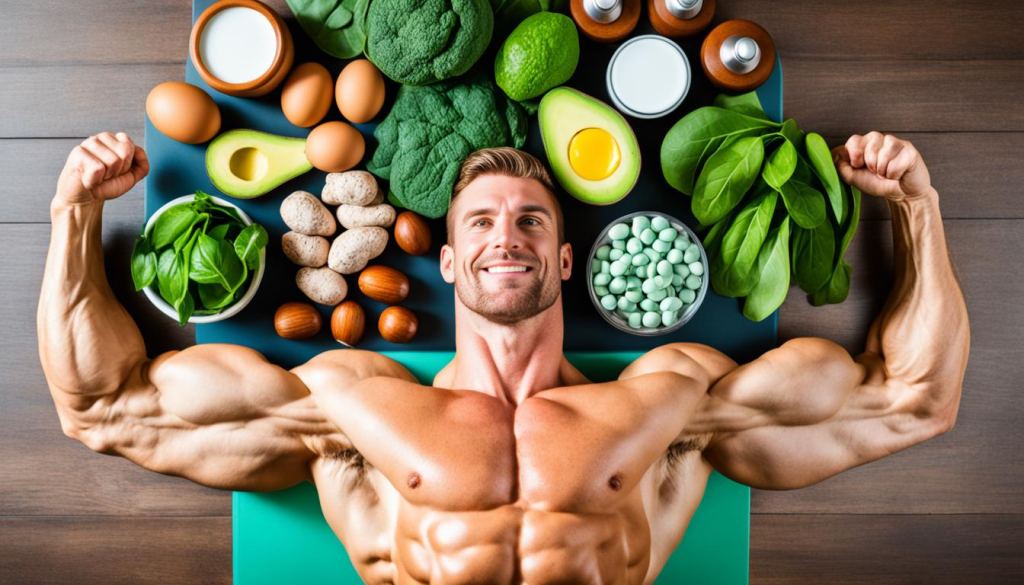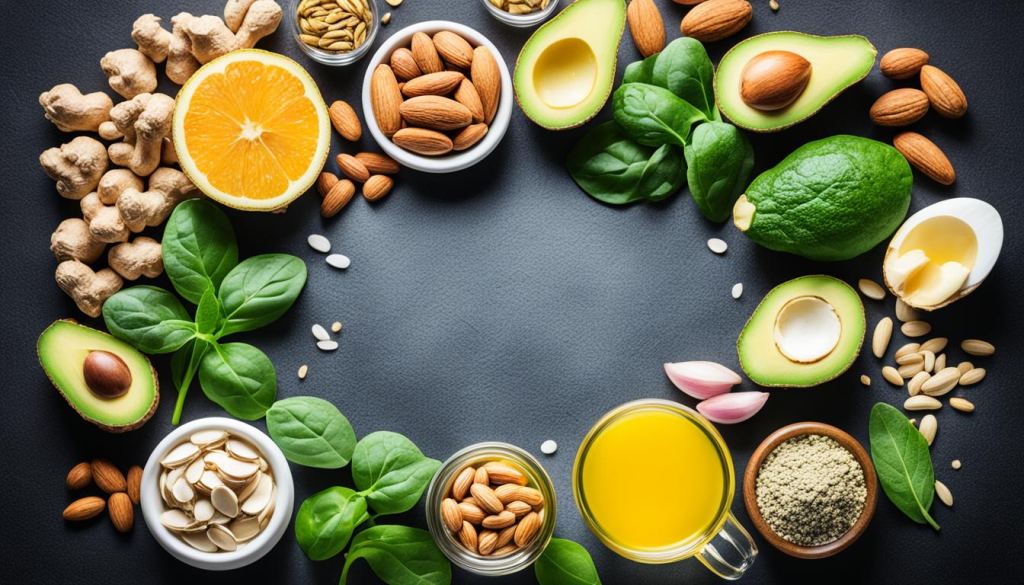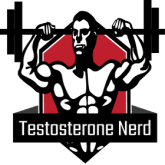Are you looking to boost your testosterone levels naturally and improve your overall health and vitality? Discover the top natural methods that can enhance testosterone production and optimize your hormone balance. From nutrition and exercise to lifestyle adjustments and vitamin supplementation, I will explore effective strategies to help you increase testosterone levels without relying on artificial means.
Boosting testosterone can have numerous benefits, from increased energy levels and improved muscle mass to enhanced libido and mood. But what are the best ways to achieve this naturally? Let’s delve into the science-backed techniques that can empower you to take control of your hormone health and achieve optimal testosterone levels.
Nutrition and Hormone Balance: Foods That Enhance Testosterone
Nutrition plays a crucial role in hormone balance and testosterone production. By incorporating specific foods into your diet, you can enhance your testosterone levels and support optimal hormonal health. Let’s explore the key foods that can boost testosterone and optimize your nutrition for testosterone production.
Foods Rich in Zinc and Magnesium
Zinc and magnesium are essential minerals that play vital roles in testosterone production. Including foods that are rich in these nutrients can help boost your testosterone levels. Shellfish, such as oysters and shrimp, are excellent sources of zinc. Spinach, almonds, and cashews are also high in both zinc and magnesium. Incorporating these foods into your diet can promote testosterone optimization.
The Role of Proteins in Testosterone Production
Proteins are the building blocks of life, and they also play a significant role in testosterone production. Including lean meats like chicken, turkey, and beef in your diet provides the necessary amino acids for testosterone synthesis. Eggs and tofu are also excellent sources of protein that can contribute to healthy testosterone levels.
Impact of Fats on Hormonal Health
Fats, particularly healthy fats, are crucial for hormonal health, including testosterone production. Foods rich in healthy fats, such as salmon, avocados, and nuts, provide essential nutrients that support optimal testosterone levels. Including these fats in your diet can help promote hormonal balance and overall well-being.
Avoiding Foods That Can Lower Testosterone
While it’s important to focus on foods that enhance testosterone, it’s equally crucial to avoid foods that can lower testosterone levels. Processed and sugary foods, for example, can have a negative impact on hormonal health and testosterone production. By limiting your consumption of these foods, you can maintain optimal testosterone levels and support your overall well-being.
By strategically incorporating foods rich in zinc, magnesium, and proteins into your diet while avoiding certain foods, you can optimize your nutrition for testosterone production. Achieving this balance is a key step in enhancing your testosterone levels and promoting overall hormonal health.
Exercise for Testosterone Boost: What’s Most Effective?
Exercise is a powerful tool for naturally increasing testosterone levels. Both strength training and cardiovascular exercise have been shown to boost testosterone in the body.
Strength Training: Weightlifting and resistance exercises are effective in building muscle mass and increasing testosterone production. These exercises stimulate the release of testosterone, helping to enhance overall fitness and strength.
Cardiovascular Exercise: Running, cycling, or engaging in other forms of cardiovascular exercise can improve fitness levels and promote testosterone production. The increased physical activity helps to optimize hormone levels and support overall health.

What is the Best Way to Boost Testosterone?
Boosting testosterone levels is a goal for many individuals seeking to enhance their overall health and vitality. While there is no one-size-fits-all approach, adopting a comprehensive strategy can provide effective and sustainable results. By combining nutrition, exercise, lifestyle adjustments, and potentially vitamin supplementation, you can optimize your hormonal health and naturally boost your testosterone levels.
“A holistic approach that addresses various factors can lead to the most effective results.”
Nutrition: A balanced diet rich in essential nutrients is crucial for testosterone enhancement. Incorporating natural testosterone boosters, such as foods rich in zinc and magnesium, proteins for testosterone production, and healthy fats, can support optimal hormone balance and testosterone levels. On the other hand, avoiding foods that lower testosterone, such as processed and sugary foods, is important for overall hormonal health.
Exercise: Physical activity plays a significant role in testosterone optimization. Both strength training and cardiovascular exercises have been shown to boost testosterone levels. Incorporating regular weightlifting and resistance exercises can help increase muscle mass and testosterone production. Additionally, engaging in cardiovascular activities like running or cycling can improve overall fitness and promote testosterone development.
Lifestyle Adjustments: Making certain lifestyle adjustments can have a positive impact on testosterone levels. Managing stress and cortisol levels is crucial, as high-stress levels can reduce testosterone production. Adequate sleep is also essential, as testosterone release primarily occurs during sleep. Additionally, understanding the impact of alcohol consumption and exposure to estrogen-like chemicals can help make informed choices that support testosterone optimization.
Vitamin Supplementation: In addition to nutrition and lifestyle adjustments, vitamin supplementation can play a role in boosting testosterone levels naturally. Vitamin D and zinc are particularly important for testosterone production and can be obtained through diet or supplements. Herbal supplements, such as ashwagandha and ginger, have also been traditionally used to support testosterone levels. However, it is essential to navigate the world of testosterone boosting supplements with caution and consult with a healthcare professional for safe and effective options.
“By addressing nutrition, exercise, lifestyle adjustments, and considering vitamin supplementation, you can enhance your testosterone levels naturally.”

| Strategy | Description |
|---|---|
| Nutrition | A balanced diet rich in nutrients that support testosterone production, including foods like spinach, lean meats, and avocados. |
| Exercise | Incorporating both strength training and cardiovascular exercise to promote testosterone development and overall fitness. |
| Lifestyle Adjustments | Managing stress, prioritizing quality sleep, and being mindful of alcohol consumption and exposure to estrogen-like chemicals. |
| Vitamin Supplementation | Optimizing testosterone levels through the use of essential vitamins, such as vitamin D and zinc, and herbal supplements like ashwagandha. |
Lifestyle Adjustments for Testosterone Optimization
Making certain lifestyle adjustments can have a significant impact on testosterone levels. By implementing these changes, you can optimize your hormone balance and enhance testosterone production naturally and safely. In this section, we will explore key lifestyle factors that contribute to testosterone optimization, including stress management, quality sleep, and awareness of alcohol and estrogen-like chemicals.
Managing Stress and Cortisol for Better Hormonal Health
Stress management is crucial for maintaining hormonal health and supporting optimal testosterone levels. High levels of stress can lead to increased cortisol production, which can suppress testosterone synthesis. To manage stress effectively, consider incorporating stress-reducing practices into your daily routine. These may include mindfulness meditation, deep breathing exercises, regular physical activity such as yoga or tai chi, and engaging in hobbies or activities that bring you joy and relaxation.
The Crucial Role of Sleep in Maintaining Testosterone Levels
Adequate sleep plays a vital role in testosterone regulation. During sleep, testosterone release peaks, contributing to hormonal balance and overall well-being. To optimize your sleep for testosterone production, establish consistent sleep patterns by going to bed and waking up at the same time each day. Create a sleep-friendly environment by keeping your bedroom cool, dark, and quiet. Avoid electronic devices before bed, as the blue light emitted can disrupt your sleep cycle. Additionally, prioritize getting seven to nine hours of quality sleep per night.
Understanding the Impact of Alcohol and Estrogen-Like Chemicals
Alcohol consumption and exposure to estrogen-like chemicals can negatively impact testosterone levels. Alcohol can inhibit testosterone production and disrupt hormonal balance. It is advisable to moderate alcohol consumption or eliminate it altogether to support testosterone optimization. Additionally, certain chemicals found in plastics, personal care products, and pesticides can mimic estrogen in the body and interfere with testosterone function. To minimize exposure to these chemicals, opt for glass or stainless steel containers, choose natural and organic personal care products, and consume organic produce when possible.
By making thoughtful lifestyle adjustments, such as managing stress, prioritizing quality sleep, and being mindful of alcohol and estrogen-like chemicals, you can support healthy testosterone levels. These changes, when combined with proper nutrition, exercise, and potential vitamin supplementation, can contribute to overall testosterone optimization and enhance your well-being.

Vitamin Supplementation: Natural Testosterone Boosters
In addition to nutrition and lifestyle adjustments, vitamin supplementation for testosterone can be an effective method for boosting testosterone levels naturally. Two key vitamins that play a crucial role in testosterone production are vitamin D and zinc.
The Importance of Vitamin D and Zinc in Your Diet
Vitamin D is a fat-soluble vitamin that helps in the production of testosterone. It is synthesized in the body when the skin is exposed to sunlight. However, many individuals may not get enough sunlight due to various factors such as location, weather, or lifestyle. In such cases, vitamin D supplementation can be beneficial for optimizing testosterone levels.
Zinc is a mineral that is essential for testosterone production. It is involved in several enzymatic reactions that support the production of testosterone and other hormones. Foods rich in zinc include oysters, beef, lamb, pumpkin seeds, and cashews. If your diet is lacking in these zinc-rich foods, you may consider zinc supplementation for testosterone to ensure adequate levels of this important mineral.
Herbal Supplements That Support Testosterone Levels
In addition to vitamins, herbal supplements for testosterone can also be used as a natural method to boost testosterone levels. Certain herbs have been traditionally used for their potential benefits in supporting testosterone production.
Ashwagandha: Ashwagandha is an adaptogenic herb that has been used in Ayurvedic medicine for centuries. It has been shown to have positive effects on testosterone levels and overall reproductive health.
Ginger: Ginger is another herb that has been used for its potential testosterone-boosting properties. It may help support healthy testosterone levels and improve fertility.
While herbal supplements can provide natural support for testosterone levels, it’s important to note that their efficacy may vary from person to person. It’s always best to consult with a healthcare professional before starting any natural testosterone boosters to ensure their safety and appropriateness for your individual needs.
Navigating the World of Testosterone Boosting Supplements
When it comes to navigating testosterone boosting supplements, it’s essential to approach with caution. Not all products are created equal, and the market is flooded with various options claiming to enhance testosterone levels. However, it’s important to prioritize safety and choose reputable brands that have been tested for quality and purity.
Consulting with a healthcare professional can help you make informed decisions about safe supplements for testosterone enhancement. They can provide guidance on suitable products, proper dosages, and potential interactions with any medications or underlying health conditions.
Conclusion
Summing up, boosting testosterone levels naturally is achievable through a combination of nutrition, exercise, lifestyle adjustments, and potentially vitamin supplementation. By adopting these natural methods, you can optimize your hormone balance, enhance testosterone production, and improve your overall health and vitality. It’s important to remember that everyone’s journey is unique, so it may take some trial and error to find the strategies that work best for you.
When it comes to nutrition, incorporating foods rich in zinc and magnesium, proteins, and healthy fats can support testosterone production. Avoiding processed and sugary foods is also crucial for maintaining optimal hormone levels. Regular exercise, including strength training and cardiovascular workouts, is essential for boosting testosterone and building muscle mass.
Alongside nutrition and exercise, making lifestyle adjustments such as managing stress levels, prioritizing quality sleep, and avoiding excessive alcohol consumption can contribute to testosterone optimization. Additionally, considering vitamin supplementation, particularly vitamin D and zinc, can further enhance testosterone levels. However, it’s important to consult with a healthcare professional before starting any new supplementation regimen.
In conclusion, taking a holistic approach to testosterone optimization by combining natural methods can help improve your overall health and vitality. Remember that it’s essential to listen to your body and make adjustments as needed. By prioritizing your hormonal health, you can enjoy the benefits of increased testosterone levels while maintaining a balanced and healthy lifestyle.
I've been fascinated by natural male hormone optimization since 2016. And ever since I've been going through boatloads of different meta-analyses and scientific data associated with increasing testosterone levels naturally. I hold a PhD degree in public health and have 10+ scientific publications on Google Scholar. Thus, in my collective work here you'll find helpful tricks, natural remedies, detailed product reviews (including stuff I've personally tried)... and more!



